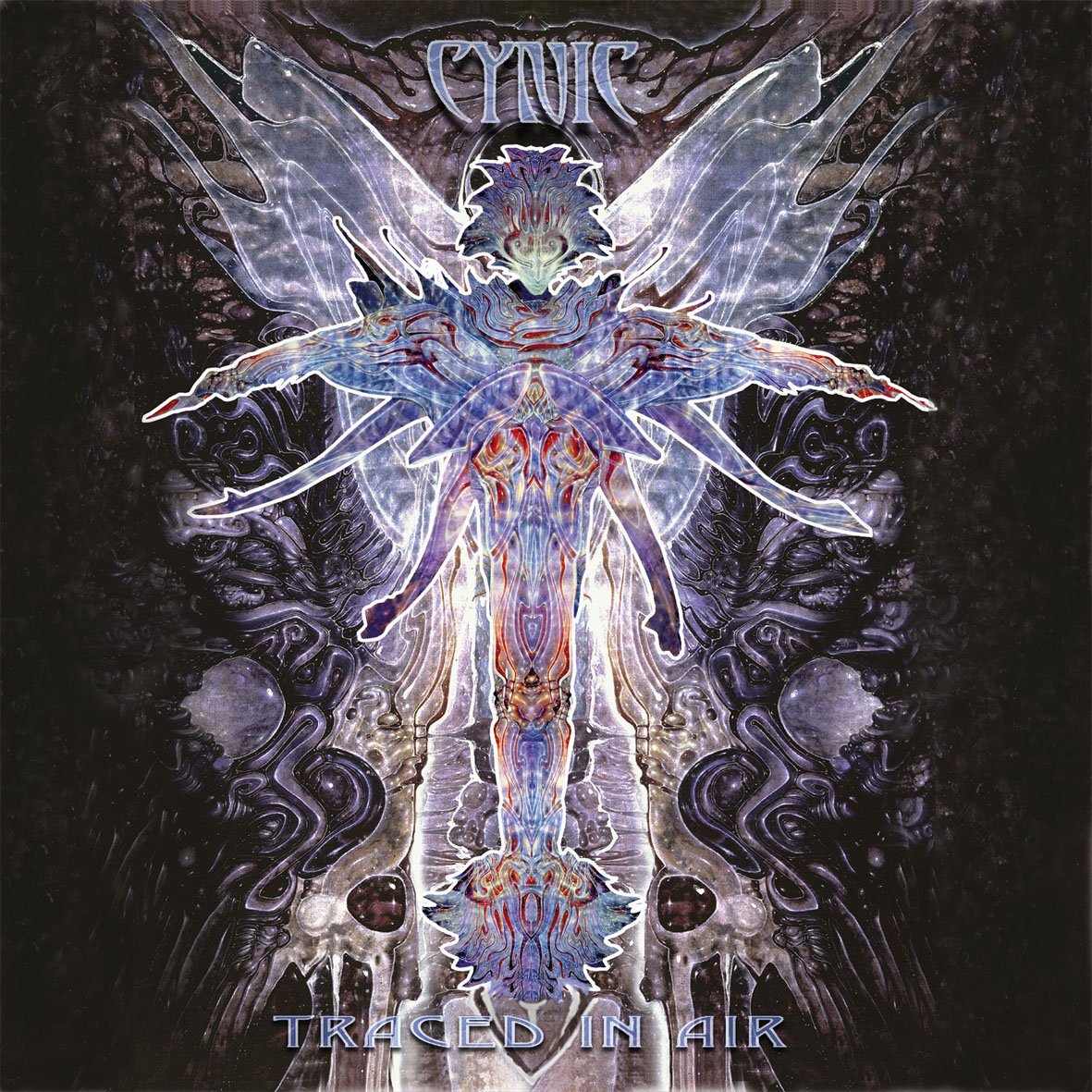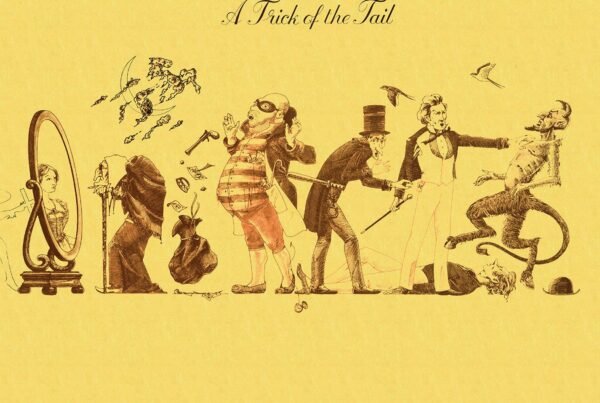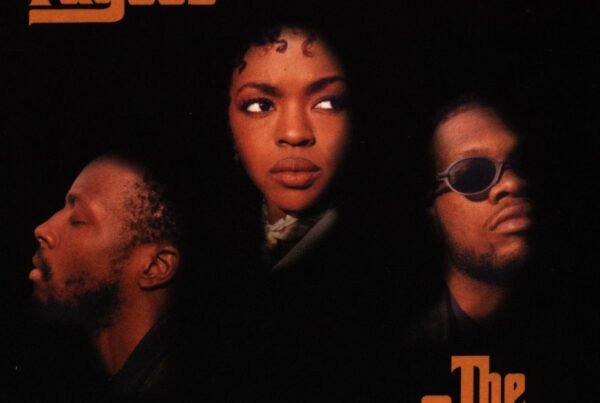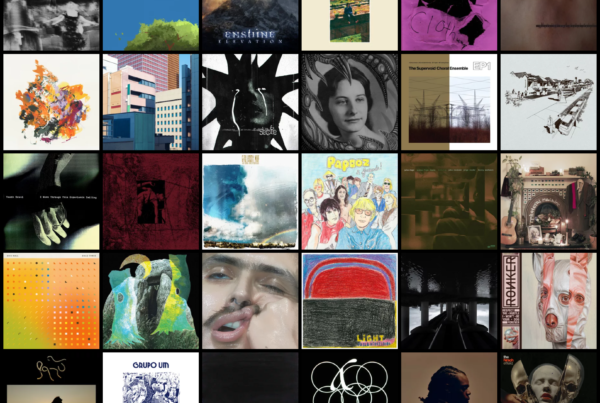There are very, very few bands in the modern prog scene that have attained a status comparable to that of Cynic. Founded in 1987 by congenial creative partners Paul Masvidal (guitars, vocals) and Sean Reinert (drums), the band has gone from underground technical death metal legends to lauded purveyors of ethereal prog rock over just a handful of stellar releases, in turn building a reputation that not even the sour separation of its two core members two years ago could seriously tarnish.
Today, we invite you to take a look back at the first record Cynic released after their initial twelve-year absence and reunion with us. 2008’s Traced In Air came as a welcome surprise even to those who hoped that the band’s return would culminate in new material from the beginning, and it marked another milestone achievement under their belts despite being only their second full-length album.
In light of this massive legacy, I have assembled a team consisting of EIN PR/social media manager Inter, editor David, and staff writers Jake and Spencer, to hopefully do Traced In Air justice through our collective recollection of its importance. Please enjoy!
Spencer Adams
I still remember very clearly my first experience with Traced in Air. I was just randomly searching through iTunes on a Tuesday (back when music was actually release on Tuesdays) and came across a curious album artwork. My interest piqued, I went to check it out and see what this album had in store. iTunes showed “Integral Birth” to be a popular track, so I decided to start there. It was all over from there; I instantly fell in love. The intricacies scattered throughout this progressive masterpiece were unlike anything I had heard at the time.
So, after checking out their previous album and finding just as much adoration for it, I went back and just played the entire album start to finish. Looking back, I can now tell that this is where my music tastes began to change away from the standard metal and post-hardcore that I had enjoyed throughout high school and started to find a love in whatever kind of music could be made.
Traced in Air is one of those records that even to this day is mesmerizing. The atmospheric melodies shaped a full sound for the album, while the synthesized vocals created a tone that I had never heard of at the time. Tracks such as “Evolutionary Sleeper” and “The Unknown Guest” were familiar to me with their heaviness I was accustomed to, yet brought a technical concept that was honestly mind-blowing to me at the time.
I don’t think that it is too much to say that this is one of the releases that shaped the musical tastes I have today. What made it all better was that I just stumbled upon this album. Even with it now being over ten years old, this is still a record that I will play at least monthly, if not more often. The shine that it had all those years ago has not faded, and its influence shows no sign of diminishing.
Inter
In preparation for this piece, I spent a good amount of the last week listening to Traced In Air. Certainly not to refresh things; these tunes feel like old friends. You know all their moves, all their little quirks and idiosyncrasies, and they are the embodiment of home and comfort for you. Cynic‘s second album is exactly that for me: one of the cornerstones of my love of prog, and probably one of my favorite album of all times, or at least easily one of my ‘most listened to’ records. It’s hard to express how much those 34 minutes mean to me, how much I get the chills from this one bass slide at the beginning of “The Space For This”, the record’s energetic elegance, and its irrestible flow.
‘If letting go means letting be’
Cynic are one of those bands many people know, but only suprisingly few have ever really dug into their discography. I wonder why. Their unique sense for riffing, beautiful melodies, and inspiring lyrics deliver a really compelling balance of heaviness, dreamy soundscapes, and spacey epicness. Paul Masvidal’s iconic vocoder-infused vocal performance always hits the right tone; Sean Reinert’s subtle, nearly mantra-like drum patterns thrive throughout the compositions; charismatic and melodiously absorbing solos cut through the layers.
Due to Cynic being basically just a two-man project consisting of Masvidal and Reinert, the band included different musicians on bass and second guitar. While recording Traced In Air, Tymon Kruidenier (ex-Exivious, Our Oceans) and the legendary Sean Melone complement this magical line-up on guitar/harsh vocals and fretless bass/chapman stick respectively, and let me tell you, both did a tremendous job adding beautiful sprinkles of beauty to the compositions. Especially Sean Malone’s bass work is absolutely and utterly outstanding, shaping the character of the album extraordinarily.
There can’t be enough praise for Traced In Air. Everyone, prog enthusiasts and beyond, should give this band and especially this their arguable masterpiece a spin.
‘From the void, I am born into waves and particle. In the uncreative eye, emerging oracle’
David Rodriguez
Those keen on the prog metal scene will see Cynic cited often as being a big influence on modern bands’ work, approach, and individual musicianship. It’s easy to see why; their work, especially Traced In Air, is as progressive as the genre can get, at least without veering into wacky, fun prog territory (and I’m all about that).
Paul Masvidal’s vocoder vocals create a robotic effect that acts as a tonal foil to the themes of humanity present throughout the album. Guitarist Tymon Kruidenier also layers growls in many of the songs, which ensures Cynic keep their edge intact. Together, these vocal techniques almost represents a duality of humankind. No matter how they’re sung, the lyrics of Traced In Air are poetic. Glorious abstraction, interpolations of Hindu mantras, the various balances of humanity – there’s a lot to chew on, but it all sounds great backed up by the wondrous instrumentation.
One of Cynic’s many strengths is their ability to balance the heavy with the atmospheric; never is Traced In Air wholly one or the other. If the stunning choral intro to “King of Those Who Know” is too light for your taste, the first distorted guitar riff you hear will cleanse your palate along with Kruidenier’s growls that come in soon after. If you think “The Unknown Guest” is a little untamed with its rawness, the spacey interlude will do your mind well. No matter your taste, Traced in Air is a spiritual experience.
As I alluded to at the beginning, whether they count them among their influences or not, who knows if we’d have bands like Alkaloid nowadays without Cynic. They may not have invented this style of music, but they’re undoubtedly a progenitor to much of the progressive metal landscape today. In a bid to give credit where it’s due, if you enjoy the likes of The Contortionist, Between the Buried and Me, and I know a lot of y’all do, check out Cynic. Any album will do, but Traced In Air is arguably their apex.
Jake Walters
Where would we be without Cynic? Where would Cynic be without Traced In Air? I don’t want to imagine that world. 2008’s LP by the crown princes of progressive metal set the high watermark for progressive metal in the new millennium, one that has arguably still not been surpassed. Given that this is their sophomore album that came 15 years after their debut makes the story of this record so much more interesting. Its somewhat unlikely success is pulled off by being one of the most dynamic yet cohesive albums in the genre, where everything from the guitar tones to the strength of the production work together build this monument to Cynic’s brilliance. Of course, none of that stuff would matter without excellent songs, and Traced In Air has no shortage of standout tracks.
“The Space For This” is one of the finest examples of a band understanding how to compose an interesting and diverse track without compromising subtlety or power. The clean guitars and vocals softly open the track, lulling the listener into a dreamy state before Sean Reinert’s tom-heavy drumming and Tymon Kruidenier’s death growls underpin Paul Masvidal’s soaring clean vocals. It’s a song that you can’t go without mentioning when it comes to this record, and you can hear its influence to this day: BTBAM’s “Condemned To The Gallows” takes several notes from it. While I would love to extol each composition on Traced In Air, this track is a microcosm of the record.
One of the biggest successes of Traced In Air is that for all of its complexity, it is also incredibly digestible. The longest track barely eclipses six minutes, and the songs’ non-linear trajectory make each one a journey where the changing of the scenery shows not only beauty, but also progress. There’s no denying the impact of this album on the progressive metal scene, and it deserves all of the praise we can bestow up on it. It’s a foundational album that needs to be in the library of every fan of music, not just fans of this particular genre.
I’m afraid that this has to suffice for now! We had a lot of fun listening back to Traced In Air and musing about its impact on our lives and the music scene in general, and I hope that this sentiment is reflected in your own reaction to this article. You can leave your own experiences with/thoughts on this band and record in the comments if you like.
Come back in two weeks for another belated look at a beloved classic. I can already tell that it’s going to be another fantastic episode of A Scene In Retrospect, so make sure to not miss out! Until then, though, do stay safe out there, and as always…
…thanks for reading!






